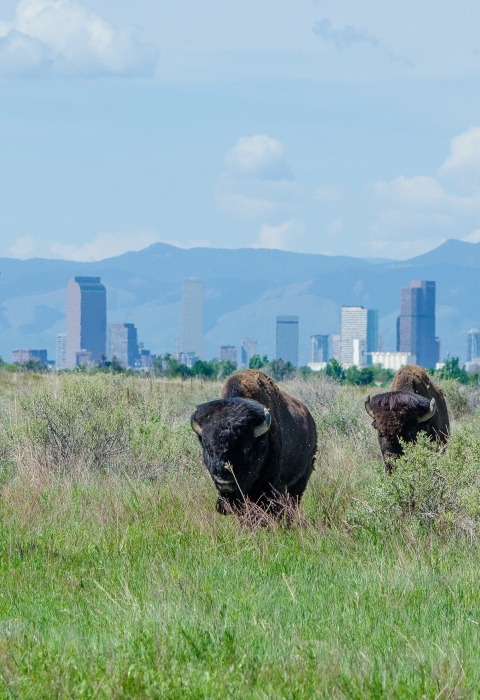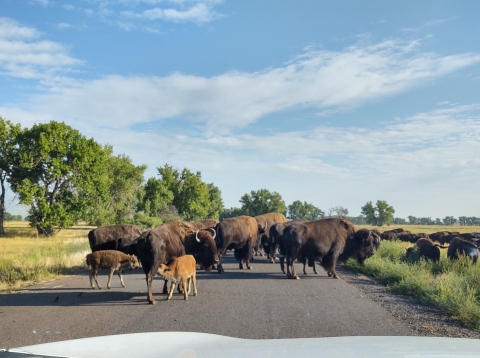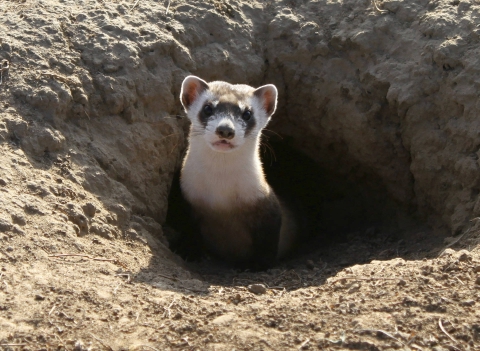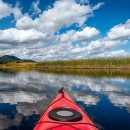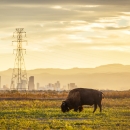Visit Us
The Rocky Mountain Arsenal National Wildlife Refuge is one of the largest urban refuges in the country. It is a sanctuary away from the hustle and bustle of busy urban life where time moves at nature's pace. With its expansive views, wildlife viewing opportunities, and recreation activities, it's easy to take a nature escape! The Refuge is open sunrise to sunset daily and closed on Thanksgiving, Christmas, and New Year's Day. Visiting the Refuge is free!
Activities
- 20 miles of easy hiking trails.
- Bicycle on select trails.
- Drive the 11-mile Wildlife Drive auto tour while listening to the Refuge podcast.
- Free nature programs.
- Wildlife viewing.
- Junior Ranger program.
- Fish seasonally at Lake Mary and Lake Ladora for a small fee.
- Photograph wildlife and landscapes.
- Practice your archery skills at the archery range.
- Explore the Visitor Center, which includes exhibits, wildlife activities, and Nature's Nest Books and Gifts.
View the Refuge Wildlife Drive and Trails Map - English, Spanish
Know Before You Go: Check out the Refuge Rules and Policies page to recreate responsibly. Remember to stay on the trails, no swimming or wading at Refuge lakes, only service dogs are allowed at the Refuge, bicycles and Class 1 e-bikes are permitted on the Greenway Trail and trails south of 64th Avenue, park in designated parking lots, and visitors must stay in their vehicle when viewing bison.
Location and Contact Information
About Us
Rocky Mountain Arsenal National Wildlife Refuge was established in 2004, in part, to protect our national symbol, the bald eagle. The land has a unique story - it has survived the test of time and transitioned from farmland, to war-time manufacturing site, to wildlife sanctuary. It may be one of the finest conservation success stories and a place where wildlife thrives.
Tours
One of the best ways to experience this 15,000 acre Refuge is by taking the 11-mile Wildlife Drive auto tour in your vehicle. Listen to the podcast, which corresponds with each mile marker along the way to discover more about the Refuge and its wildlife. The Wildlife Drive takes about 45 minutes to 1 hour to complete and is free.
Know Before You Go
- The Wildlife Drive is open to motorized vehicles; speed limit is 30 mph.
- Follow the directional symbols. Park vehicles only in designated areas on map.
- Stay on paved roads and observe all posted signs such as "Stay in Vehicle" or "Area Closed".
- Stay in your vehicle when the road becomes one way only.
- Always stay at least 75 feet (23 meters) away from bison.
- Be sure to view the Wildlife Drive and Trails Map - English, Spanish for map and details.
- For winter snowstorms, the Refuge may delay opening to plow the roads.
What We Do
Wildlife conservation is at the heart of the National Wildlife Refuge System. It drives everything on U.S. Fish and Wildlife Service lands and waters managed within the Refuge System, from the purposes for which a national wildlife refuge national wildlife refuge
A national wildlife refuge is typically a contiguous area of land and water managed by the U.S. Fish and Wildlife Service for the conservation and, where appropriate, restoration of fish, wildlife and plant resources and their habitats for the benefit of present and future generations of Americans.
Learn more about national wildlife refuge is established to the recreational activities offered to the resource management tools used. Using conservation best practices, the Refuge System manages Service lands and waters to help ensure the survival of native wildlife species.
At Rocky Mountain Arsenal National Wildlife Refuge we are working for wildlife to continuously ensure that our natural resources are conserved for current and future generations to enjoy.
